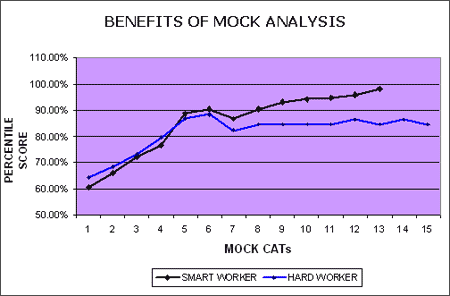|
| Help | |
| You are here: Rediff Home » India » Get Ahead » Careers » Cracking CAT |
|
As CAT 2007 approaches, every aspirant begins to feel and respect the fact that some fundamental shifts are required in preparation. And still by the end of the day you may ask yourself: Am I preparing the right way for the C-Day? Will it lead to a substantial improvement in my score? Is there some litmus test to instantly check at any point whether my approach is effective or not? And most importantly, whom to benchmark my preparation against? How do I effectively analyse my mock CATs? Do not worry. If you think only you have such nightmares; think again. I'd estimate that 95% of aspirants ask themselves the same questions. Here are some keys to remember when discussing mock CATs. Mock CATs -- simulation testing Research shows that simulation testing helps you prepare for the main event, whether it be chopping wood or kicking a football. But remember that simulation testing is quality over quantity � don't just churn our mock CAT after mock CAT. Hence, national level mocks are the need of the hour. Mock CATs are created through the simulation of exam patterns and test-taking environment in order to:
This is, at this stage, the best way to improve your percentile in CAT. Moreover, a thorough investigation of your mock CAT can motivate you to look for more innovative ways of solving certain questions which will save time in subsequent tests. You are a sprinter Benchmarking is important in any competition. The big question is how to benchmark and what to measure. I believe a CAT aspirant's situation is more or less similar to that of a 100 metre sprinter:
Your micro-motions -- time wasted in looking at your wrist watch, transferring of answers to the OMR sheet, sharpening the pencil, using your handkerchief on the cold CAT morning etc. -- if eliminated can fetch you extra time to attempt a few more questions. What does it take? You will not understand the best way to prepare at this stage unless redefine the high frequency words from your CAT preparation dictionary. The words like revision, shift and my score need to be redefined or modified. Revision: Revision is no longer re-doing or capturing the basics of Math, Verbal and DI all the time; rather it must be executed in a more scientific manner. Instead of deciding arbitrarily what to revise, there should be some simulation tests that give you feedback on which areas to particularly work on and which to totally ignore. Shift: No small shifts of focus help here. You need to NOW think strictly from the point of view of the final exam -- what combination of speed and accuracy is required, which areas need your immediate attention, what is the right order in which questions and sections are to be attempted. My score: CAT is not about your performance and your score. It is about your score vis-�-vis all the other aspirants'. Hence the word PERCENTILE should replace absolute score. Easy questions: We need to change our perception of easy questions. Easy questions in CAT are not the ones that you are sure you can solve. They are the ones that consume minimum time. Most of the times, they are just one line in length. Between the two mocks: Gone are the days when quantity of mocks was the key. Today there is a lot of analysis to be done between the two national level mocks. Because of the increasing number of CAT aspirants, it's important to make sure your preparation is top-notch. Objective analysis and measurements of certain parameters act as a litmus test that instantly shows effectiveness of your test-taking strategy.
The above graph explains how a smart worker -- one who analyses one mock and works on his specific weak areas before giving the next -- takes an edge over the hard worker -- one who works on the principle of giving as many mocks as possible -- in the long run. What you have to do is to keep a record in your diary or in an excel sheet on the following vital parameters that distinguish between an average attempt and a winner's attempt: How many rounds Choice of questions Accuracy Percentile Left-outs Time savers vs. time takers Final thoughts Atul Prashar is a competitive examination expert working for Top Careers and You | |||||||||||||||||||||||||||||||||||||||||||||||||||
|
| © 2007 Rediff.com India Limited. All Rights Reserved. Disclaimer | Feedback |
